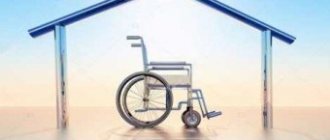Housing subsidy for disabled people
Housing subsidies are provided by the federal budget in a certain order. The subsidy program is valid for 6 months.
During this time, people with disabilities must find an option and purchase housing. Not only adults, but also children and people with disabilities since childhood have the right to it.
Some categories of citizens can receive a housing subsidy in 2021:
- Young families with children, if the age of the parents (both or one of them) is less than 35 years.
- Large families with three or more children, including adopted ones.
- Families with minimal income.
- Orphans.
- Combatants, veterans of the Great Patriotic War and their widows.
- Military personnel and participants in the liquidation of the Chernobyl accident.
- Civil servants and public sector employees, residents of the Far North.
IMPORTANT! The money is transferred by bank transfer to the owner of the residential premises.
Sequence
If citizens with disabilities registered with the administration at their place of residence in the social protection department before 2005, then funds for the purchase of housing will be allocated from the territorial resources of the regions.
Persons who registered later can count on a subsidy on a first-come, first-served basis, depending on the date of registration.
REFERENCE! In 2021, the amount of subsidies will depend on the need, funds received, which will be divided by an amount equal to state aid per person.
Features of housing subsidies for disabled people
Since this free assistance is allocated for people with disabilities, there are a number of rules that you need to familiarize yourself with:
Healthy relatives of a disabled person cannot count on square meters.- If there are several disabled people in a family, then each of them can apply for a housing subsidy.
- If there is a disabled child in the family, then the privilege applies to the entire family.
- Wheelchair users should receive subsidies out of turn.
- According to existing standards, 18 m2 is allocated for each family member.
Types of payments to disabled people
Disabled people are people who have completely or partially lost their legal capacity due to a serious illness or injury. To maintain a normal life, they require social protection and material compensation, which the state takes care of. As a rule, people with disabilities receive different types of support:
- monthly payments;
- assistance for paying utility bills;
- monthly provision;
- social funds;
- assistance for families with disabled children;
- funds to improve living conditions.
You can also count on additional compensation in the form of subsidies for the purchase of housing for disabled people under programs established by Russian legislation. The Russian Federation also has regulations and acts that regulate the procedure for obtaining benefits and other privileges for people who have partially or completely lost their legal capacity.
Housing subsidy programs allow you to become the owner of your own property or improve living conditions in existing housing. The procedure and rules for awarding financial assistance for real estate are determined by local governments or employers who have their own housing stock.
Possible amount of subsidy for the purchase of housing for disabled people
IMPORTANT! Since in each region a square meter of living space in the real estate market costs differently, no one can name the exact amount of the subsidy.
In addition, government support will depend on the number of people in the family eligible for assistance for purchasing housing. As a rule, the subsidy amount cannot be more than 70% of the value of the property.
It is clear that it is impossible to buy housing with government support alone. It’s a little easier for people who had their own apartment or house. They can earn part of the amount from the sale of existing real estate. The rest of the money will have to be taken out on a mortgage loan.
What do you need to provide?
On the way to receiving financial assistance, it is necessary to collect documents that confirm the fact of the need for housing. After this, documents will be needed to receive a subsidy. The procedure for recognizing those in need of housing in accordance with Article 51 of the Housing Code:
- Belonging to one of 5 groupseligible for housing assistance from the state:
- lack of own housing;
- availability of housing, which in terms of 1 person does not provide each resident with a minimum area;
- the current place of residence does not meet sanitary requirements (the house is recognized as dilapidated, unsafe and subject to demolition);
- living in an apartment with non-blood relatives, as well as patients with a chronic infectious disease, etc.;
- if a disabled person lives in a dormitory or a room in a communal apartment, except for the period of his work in seasonal or temporary work.
- Submission of documents, which confirms the above factors, to the social protection authorities at the place of residence. After receiving the status of someone in need of housing, the following documents are collected for submission to the local administration and placement in the queue:
- an application for financial assistance for the purchase or expansion of housing on behalf of a disabled person;
- certificate of a person in need of housing;
- information from the house register about disabled people living together in the current housing area;
- medical examination report on disability indicating its duration;
- rehabilitation program, which describes the requirements for housing and lifestyle: the presence of a ramp at the entrance, the need to accommodate a person on the ground floor, the proximity of new housing to healthcare institutions and the patient’s caregivers.
How is housing subsidy for disabled people processed?
And now you need to figure out what documents, besides a passport, a disabled person needs to go for a subsidy:
- application for placement on the waiting list;
- a certificate confirming disability;
- a copy of the certificate of completion of the individual rehabilitation program;
- a copy of a bank account to receive a subsidy;
- if a representative handles the documents instead of the applicant, then he must have a power of attorney certified by a notary and a passport.
Documents are submitted to the social protection department at the place of residence.
Local governments or the mayor's office sometimes require a certificate of family composition. Also, documents from the Unified State Register of Rights to Real Estate, which indicates information about the owner.
After receiving the application, the administration at the place of residence analyzes the information received within 20 days. Then, after the assessment, a positive or negative decision is made.
If the subsidy is approved, the applicant receives a housing certificate for a certain amount . In addition, the applicant is assigned an individual serial number. This will make it easier to receive further assistance from the state.
ATTENTION! The amount received must be used within 6 months.
Other benefits for all groups
In addition to housing subsidies and benefits for paying for apartments and utilities, people with disabilities have a number of other benefits, which are also provided free of charge.
Here are some subsidies among others:
- EDV (monthly cash payment). This subsidy can be used by disabled people of any of the three groups, as well as disabled children, concentration camp prisoners, war and labor veterans and other categories of citizens. The amount of EDV for each category is calculated differently.
- Social package, which includes compensation for medications, sanatorium stay, travel to the sanatorium. The general package of social services from February 1, 2021 is 1075 rubles 19 kopecks.
- Discounts for travel on public transport are provided to disabled people, children with disabilities and their accompanying persons. A travel ticket costs 200 rubles.
Documents for subsidies for disabled people
A person who has the status of a disabled person can submit an application in the established form (issued by the social protection department) to receive a subsidy for housing and communal services. To do this you need to collect a package of documents:
A certificate from a medical institution confirming the diagnosis.- Passport (for personal visit) and its copy.
- Certificate of family composition and copies of children’s birth certificates.
- A receipt for no debt on utilities.
In addition to copies, you must have original documents with you.
The application and documents are submitted to the administration at the place of residence to the social protection department. Today it is possible to submit an application through the State Services portal. However, documents will still have to be submitted in person. Registration of the subsidy, if there are no errors in the documents, all information is reliable, takes place within 10 days.
IMPORTANT! The funds go to post offices or to the bank account of the disabled person.
State support for disabled people to pay for housing and communal services is designed for 6 months. Then you will have to collect the documents again.
Based on what legislative document are payments made?
The right to receive financial assistance for the purchase of housing is described in Article 28.2. Federal Law No. 181 “On the social protection of disabled people in the Russian Federation.” Taking into account this document, the subsidy is available to all citizens who are in line to receive it with a correctly collected package of documents confirming their need to renovate existing housing or obtain a new one.
Read more about who is entitled to subsidies for an apartment in this material, and how to get a subsidy for an apartment can be found here.
Is there a difference in priority for benefits for groups 1, 2 and 3?
Many believe that disabled people of group 1 have more rights to receive assistance. In fact, the law does not provide for division into groups 1, 2 and 3; if a person has a certificate of disability, he gets in line to receive benefits for buying an apartment in the general manner.
Important! Based on Resolution No. 47P.54, wheelchair users, if they do not have their own housing, have the right to receive an apartment before their turn.
Cases in which persons with disabilities have the right to receive priority apartments:
- if the current housing does not meet basic requirements (for example, a wheelchair user lives on the upper floors, by law he has the right to receive housing on the ground floor);
- When a disabled child reaches the age of majority (18 years), the state in most cases provides separate housing if the patient is able to live and care for himself independently;
- if more than two families who are not related are living in one apartment, they have the right to separate housing;
- if a disabled person and a person suffering from a serious infectious or mental illness live in the same apartment.






